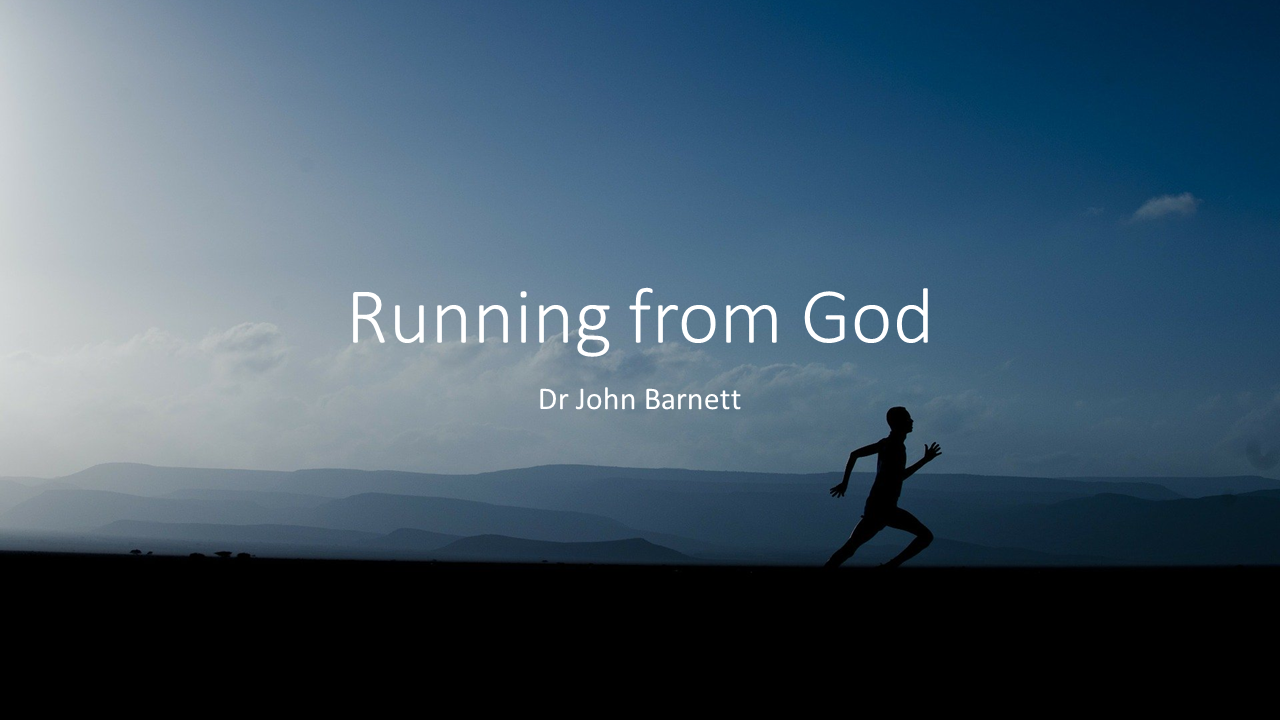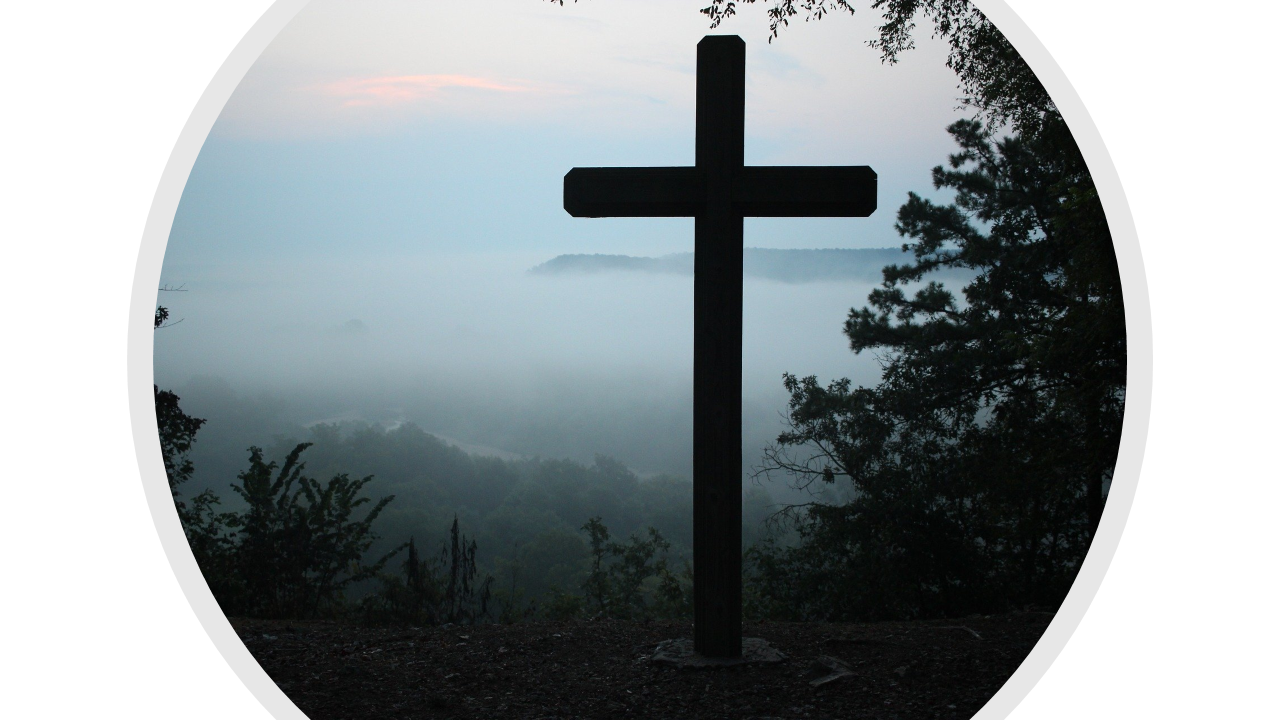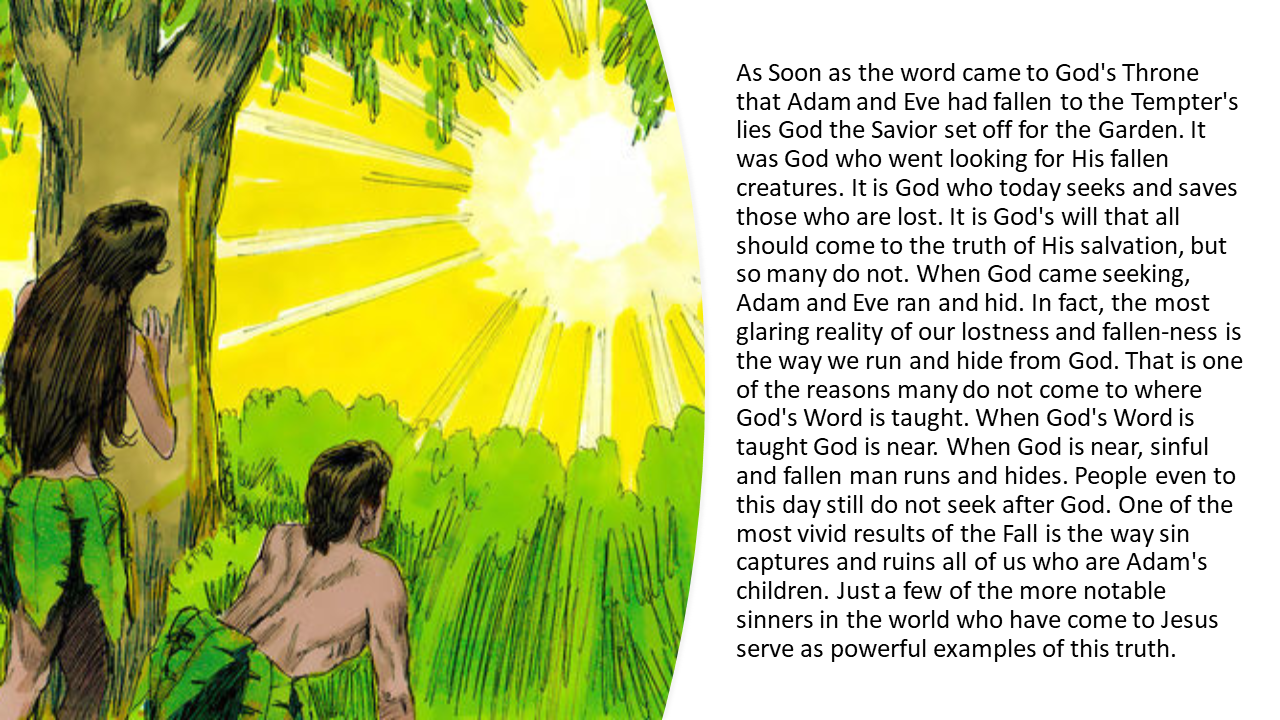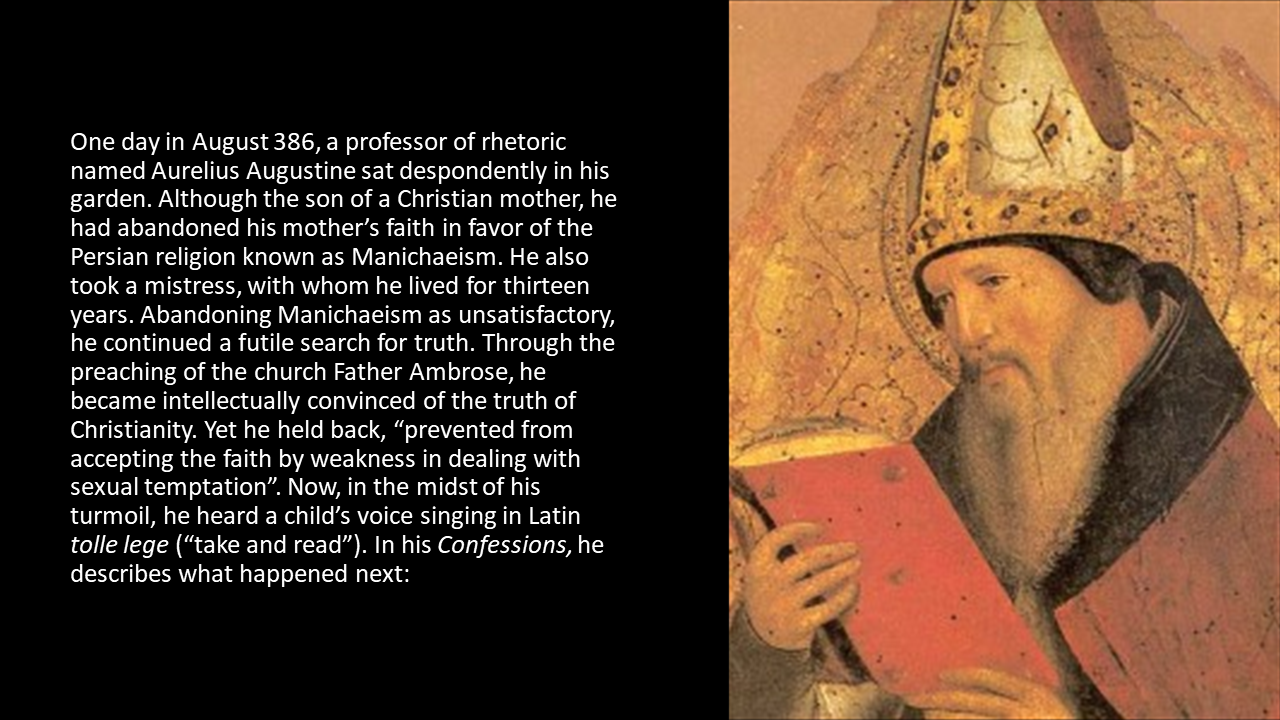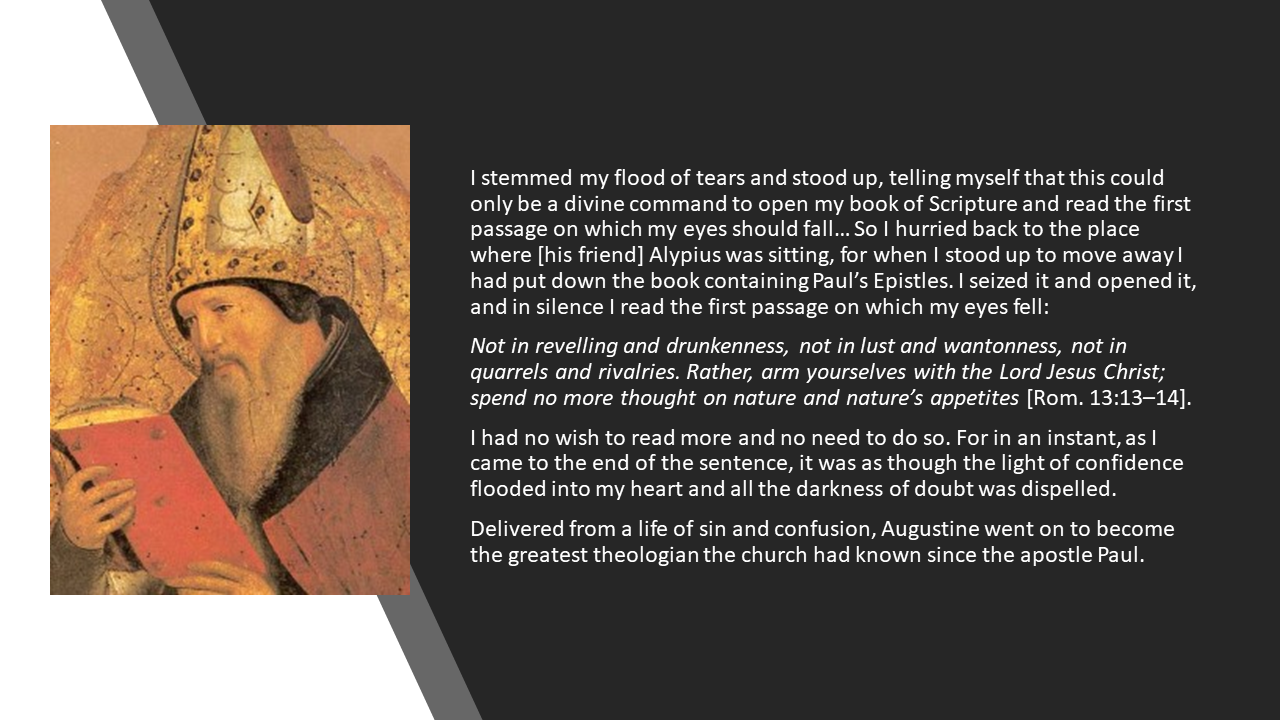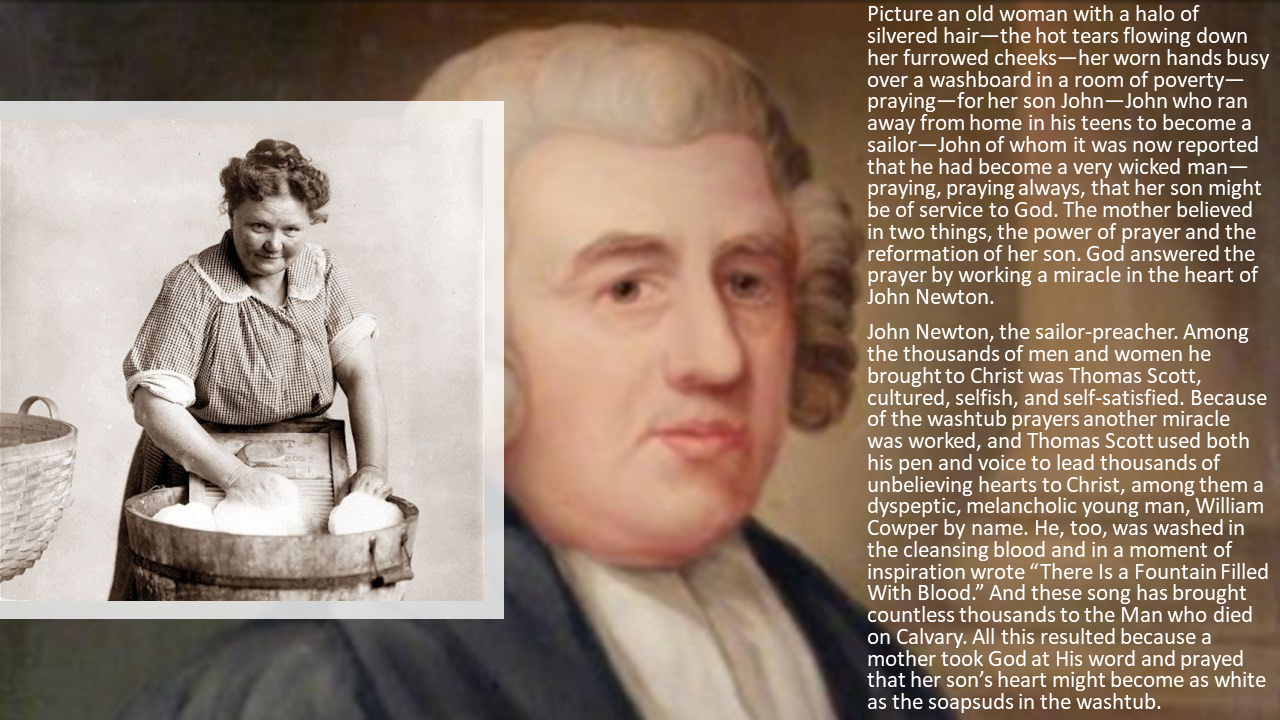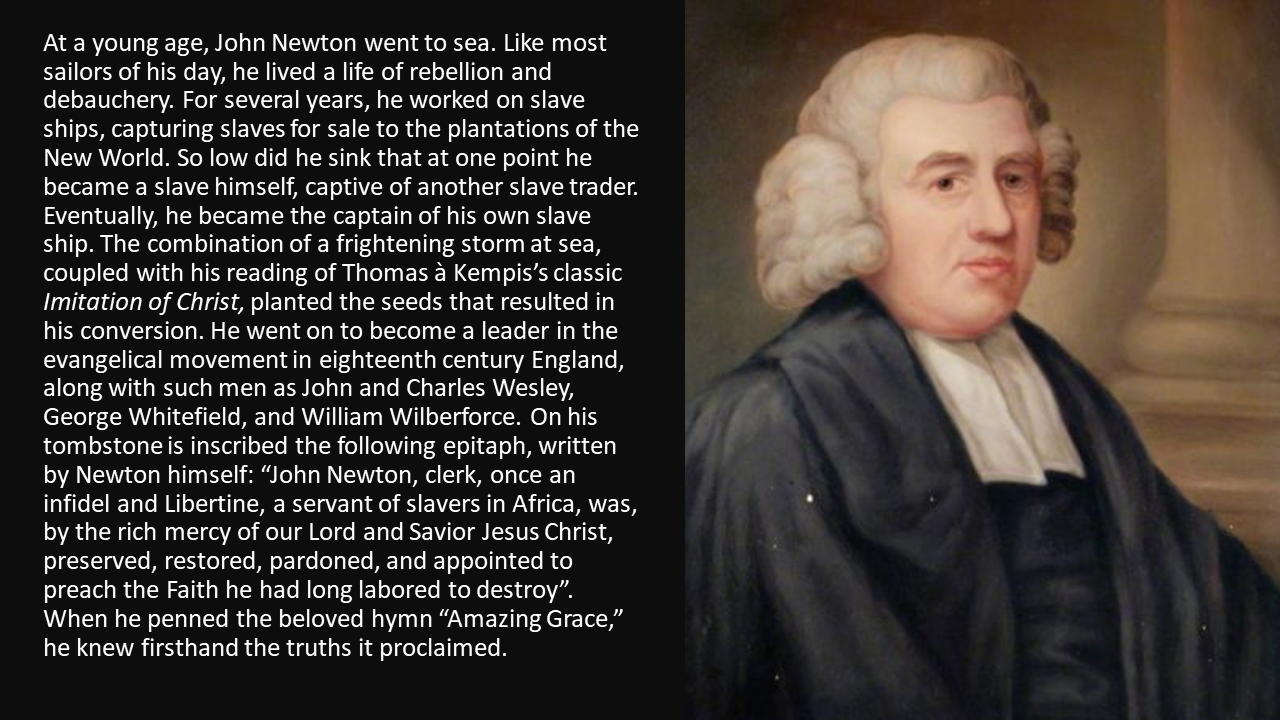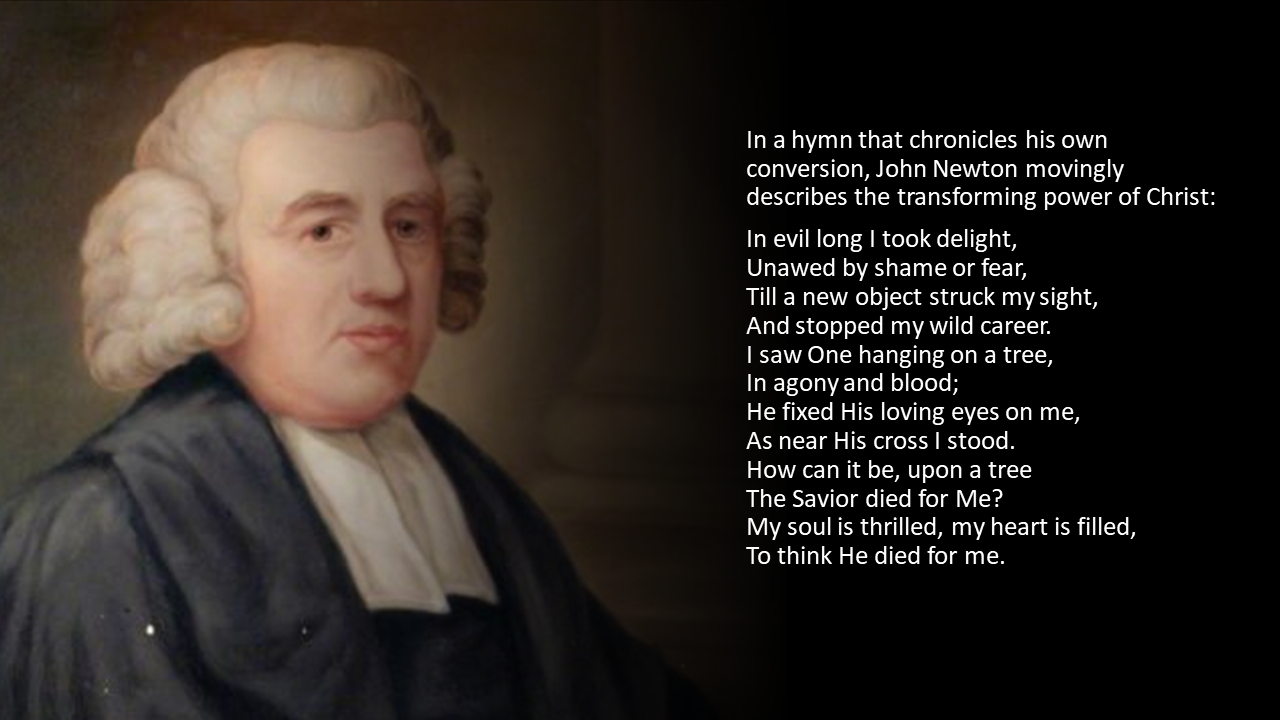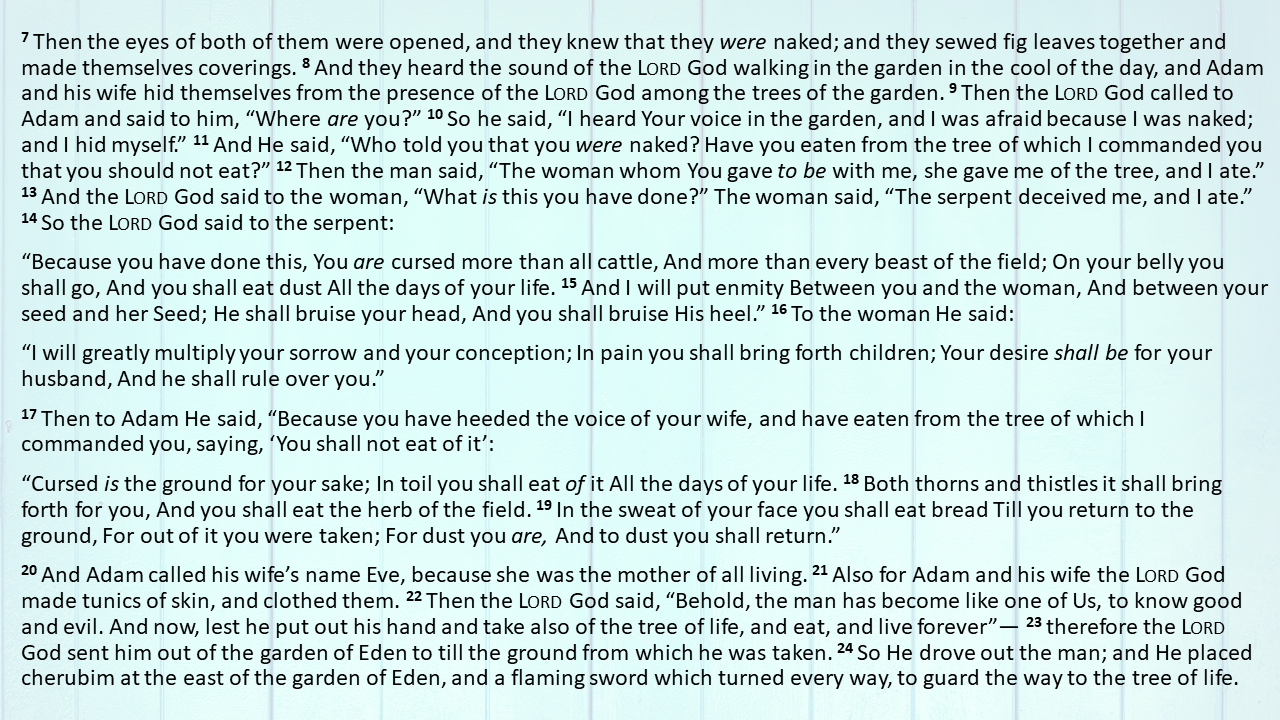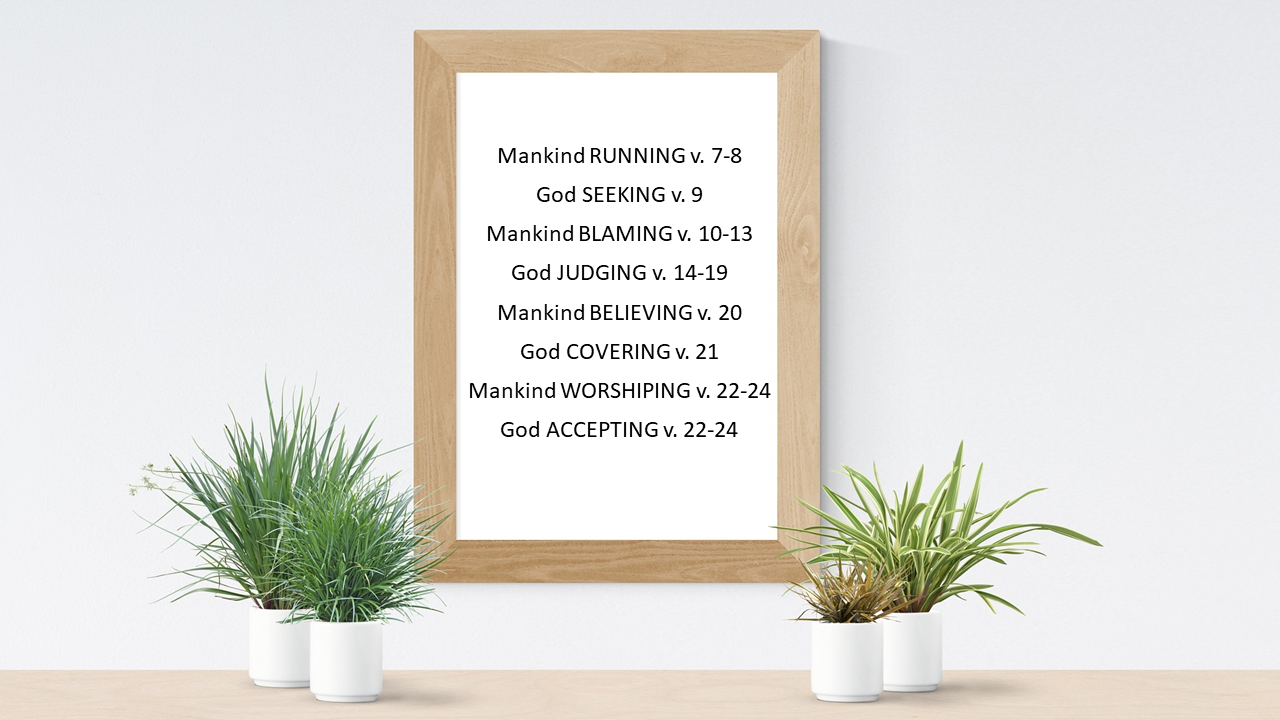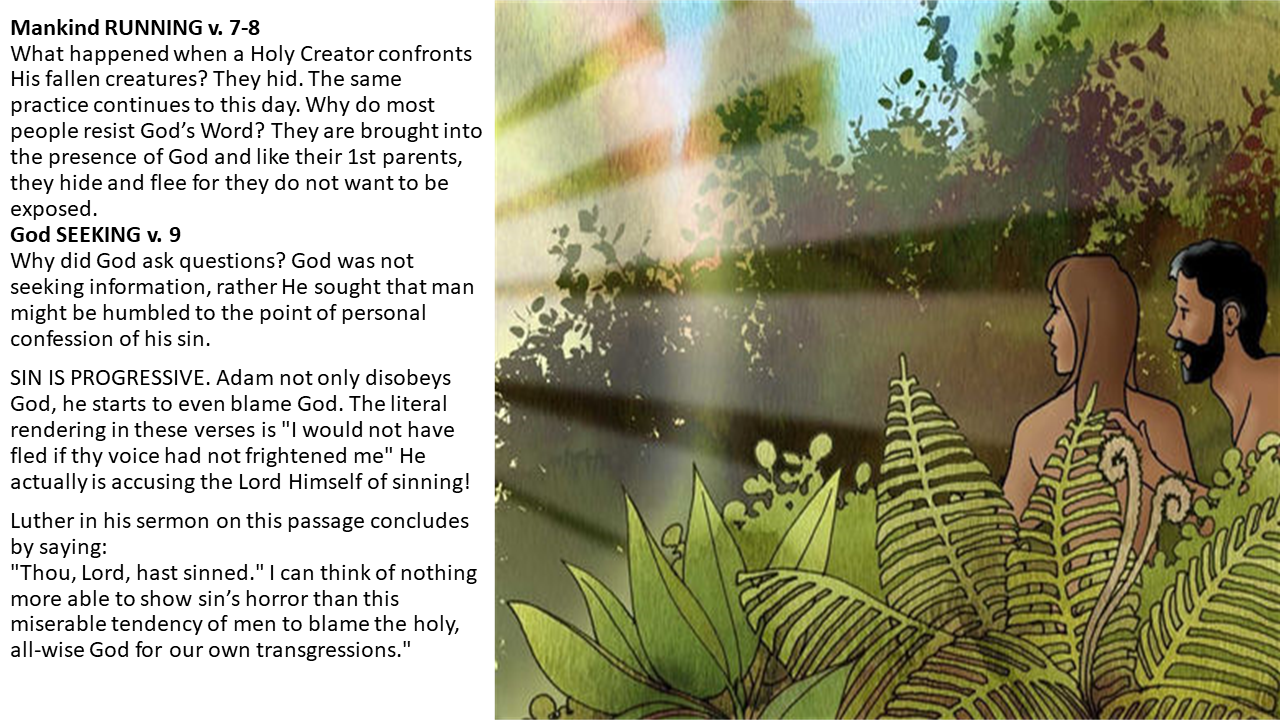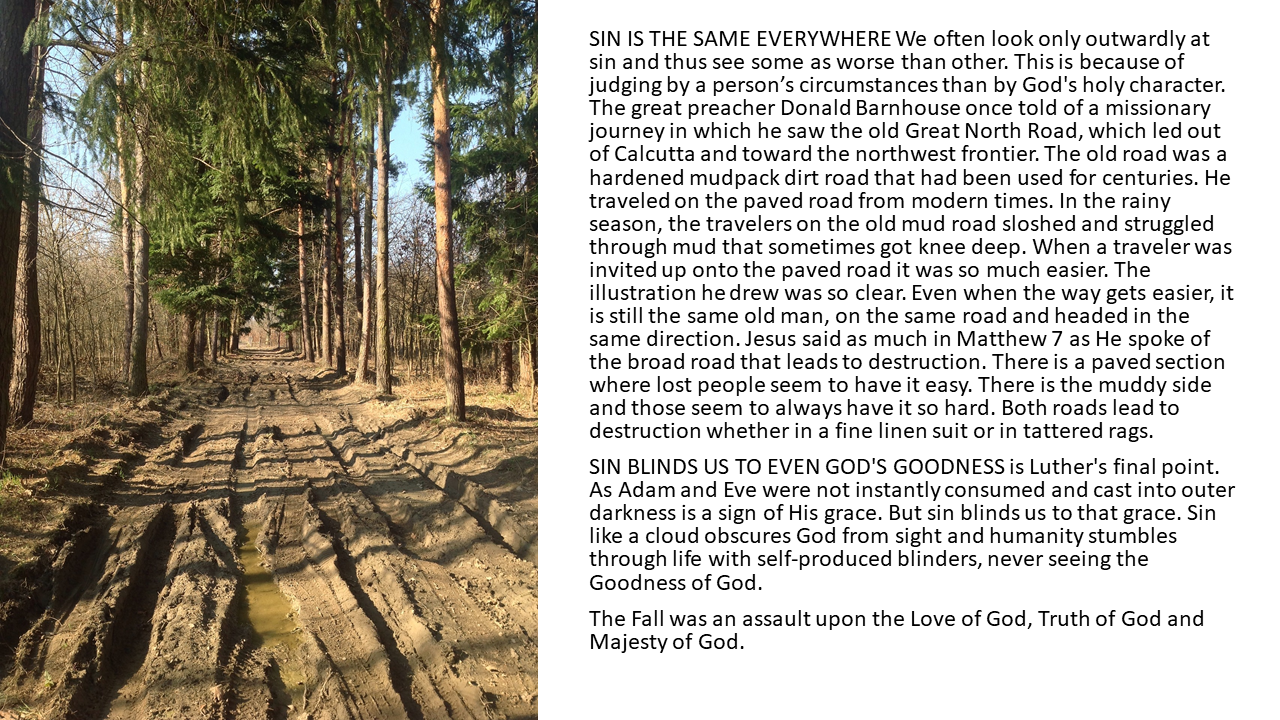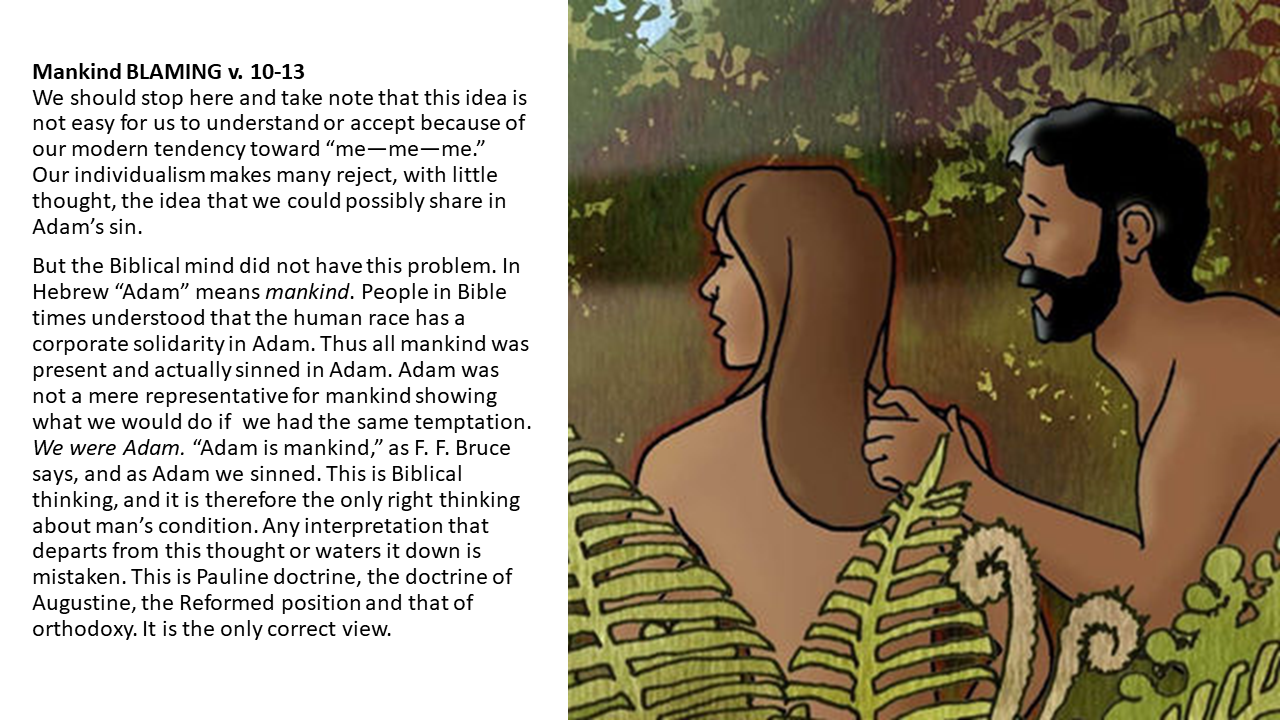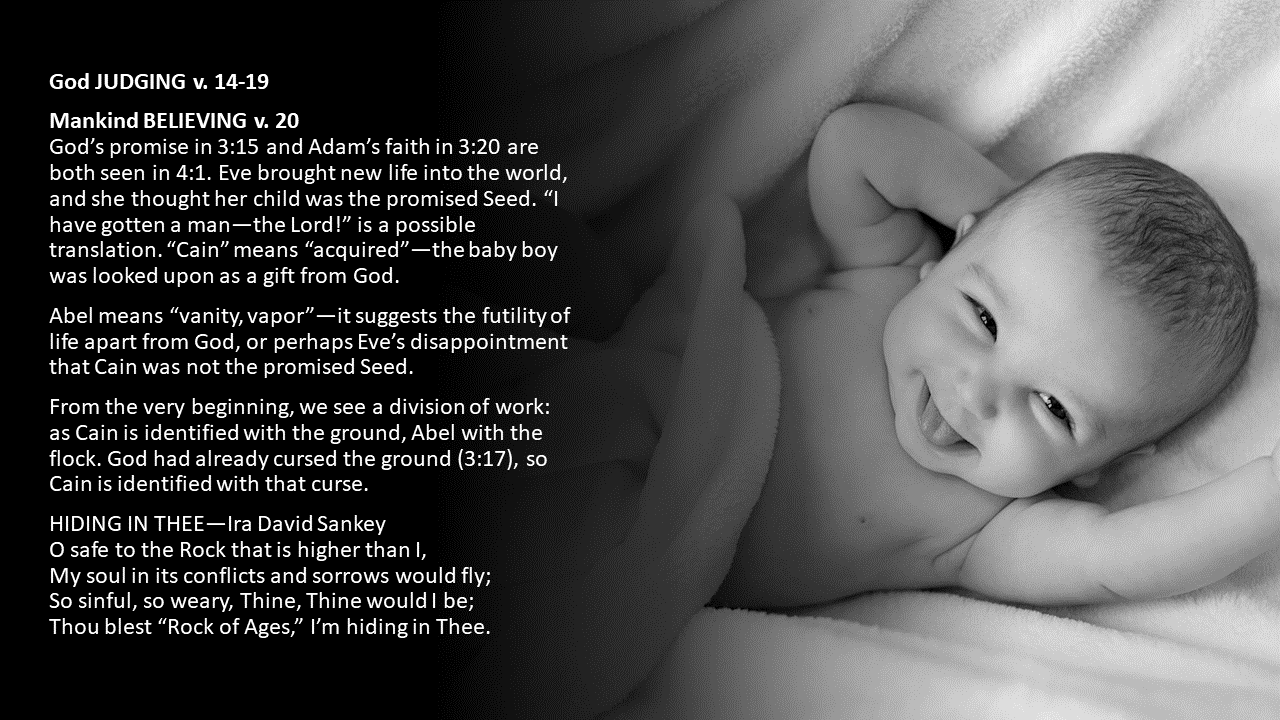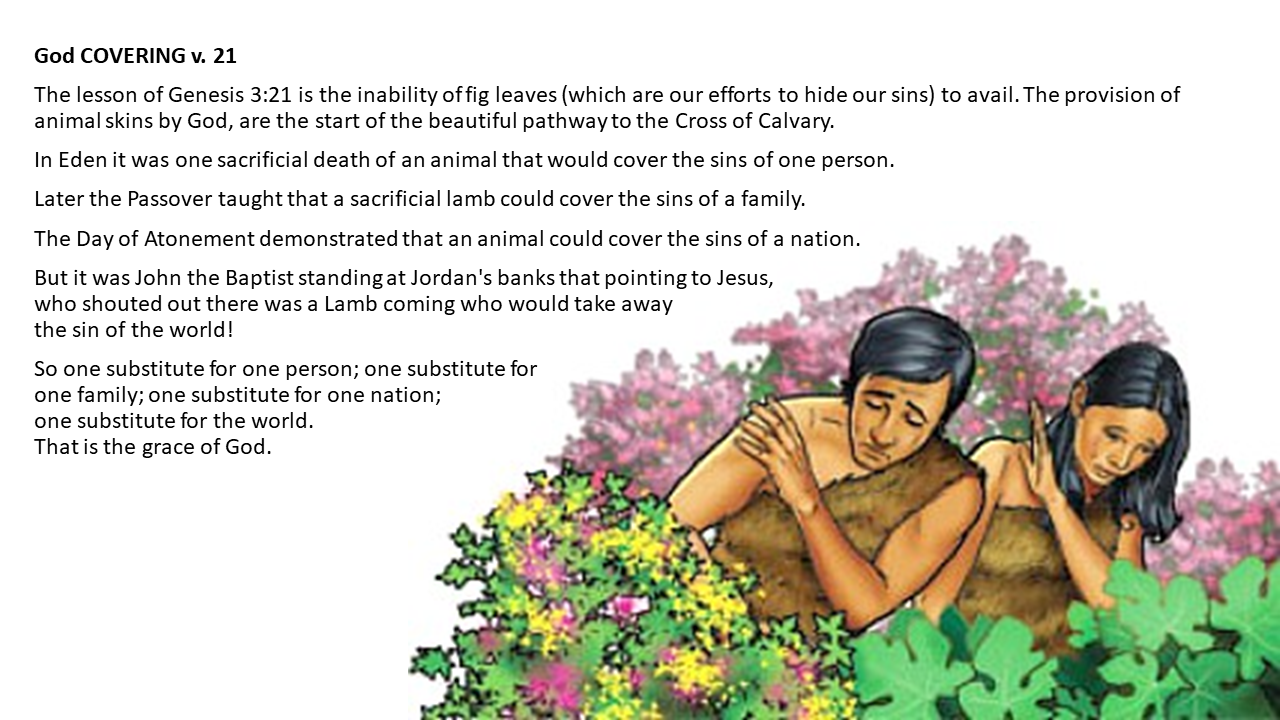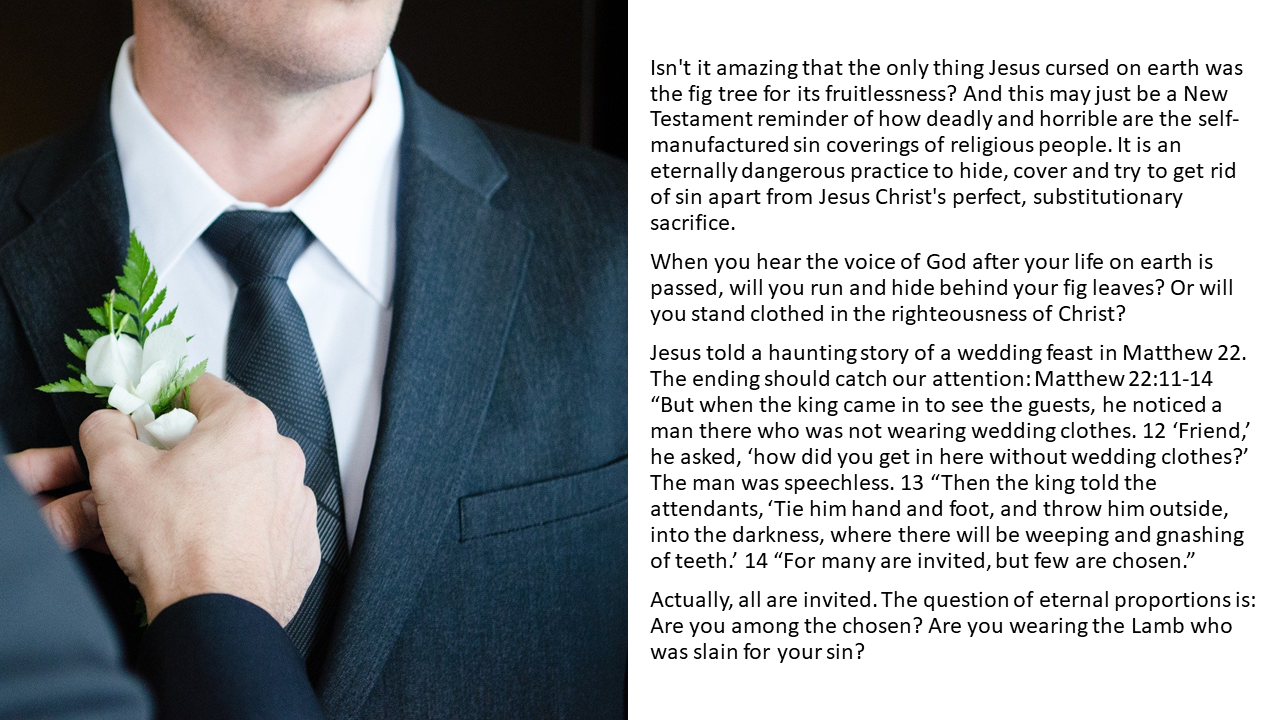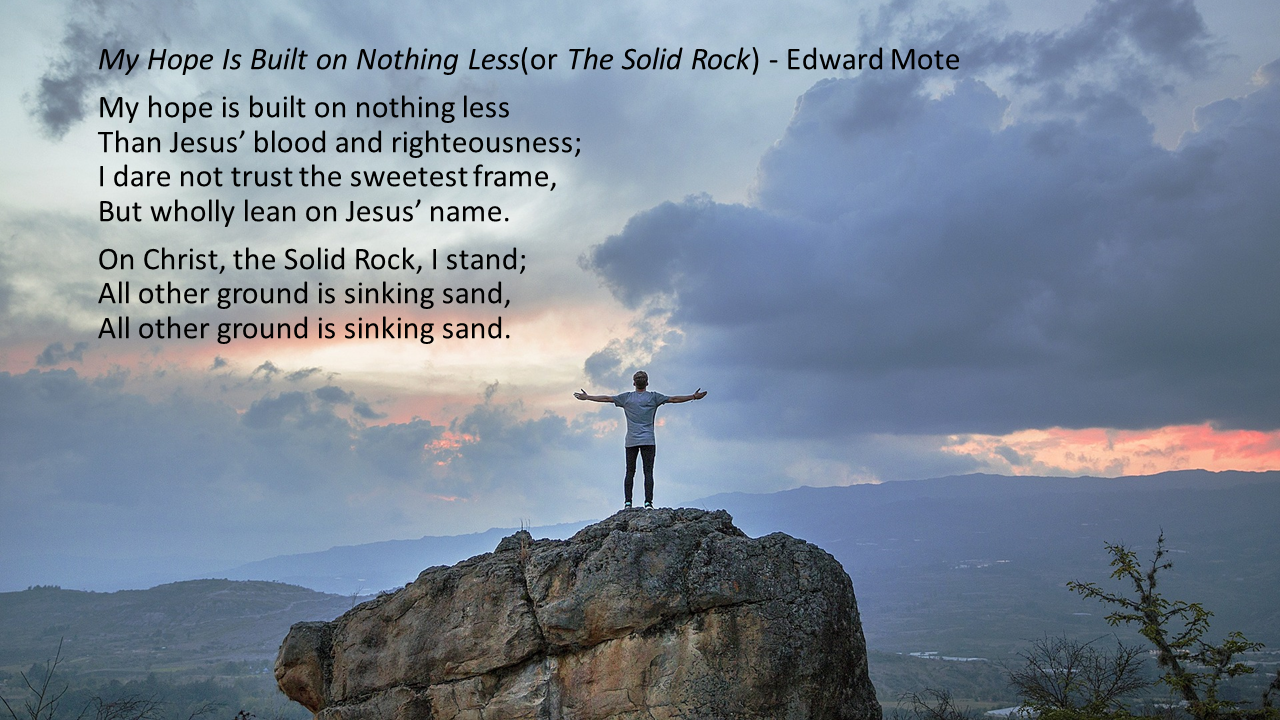If the YouTube video above is not available, here are two other ways to view:
CPL-12 GEN-12
991219AM
In this sermon we conclude this visit to Paradise Lost. This is our 6th and final glimpse into our 1st parents’ ruin. Please open to Genesis 3:7-24. First let me trace the outline of these 18 verses:
- Mankind RUNNING v. 7-8
- God SEEKING v. 9
- Mankind BLAMING v. 10-13
- God JUDGING v. 14-19
- Mankind BELIEVING v. 20
- God COVERING v. 21
- Mankind WORSHIPING v. 22-24
- God ACCEPTING v. 22-24
Now, let’s stand and ask God to illumine our hearts as we read these verses. Genesis 3:7-24. And as we stand together, listen to God’s flawless record of the spiritual death of Adam and Eve as evidenced by their running and hiding!
As Soon as the word came to God’s Throne that Adam and Eve had fallen to the Tempter’s lies, God the Savior set off for the Garden. It was God who went looking for His fallen creatures. It is God who today seeks and saves those who are lost. It is God’s will that all should come to the truth of His salvation, but so many do not. When God came seeking, Adam and Eve ran and hid. In fact, the most glaring reality of our lost-ness and fallen-ness is the way we run and hide from God. That is one of the reasons many do not come to where God’s Word is taught. When God’s Word is taught God is near. When God is near, sinful and fallen man runs and hides. People even to this day still do not seek after God.
One of the most vivid results of the Fall is the way sin captures and ruins all of us who are Adam’s children. Just a few of the more notable sinners in the world who have come to Jesus serve as powerful examples of this truth.
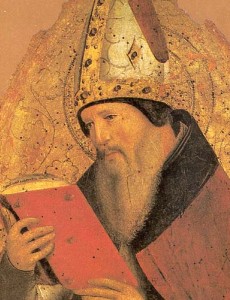 Saint Augustine
Saint Augustine
One day in August 386, a professor of rhetoric named Aurelius Augustine sat despondently in his garden. Although the son of a Christian mother, he had abandoned his mother’s faith in favor of the Persian religion known as Manichaeism. He also took a mistress, with whom he lived for thirteen years. Abandoning Manichaeism as unsatisfactory, he continued a futile search for truth. Through the preaching of the church Father Ambrose, he became intellectually convinced of the truth of Christianity. Yet he held back, “prevented from accepting the faith by weakness in dealing with sexual temptation” (R. S. Pine-Coffin, “Introduction,” to Saint Augustine: Confessions [New York: Penguin, 1978], 11). Now, in the midst of his turmoil, he heard a child’s voice singing in Latin tolle lege (“take and read”). In his Confessions, he describes what happened next:
I stemmed my flood of tears and stood up, telling myself that this could only be a divine command to open my book of Scripture and read the first passage on which my eyes should fall. . . . So I hurried back to the place where [his friend] Alypius was sitting, for when I stood up to move away I had put down the book containing Paul’s Epistles. I seized it and opened it, and in silence I read the first passage on which my eyes fell:
Not in reveling and drunkenness, not in lust and wantonness, not in quarrels and rivalries. Rather, arm yourselves with the Lord Jesus Christ; spend no more thought on nature and nature’s appetites [Rom. 13:13-14].
I had no wish to read more and no need to do so. For in an instant, as I came to the end of the sentence, it was as though the light of confidence flooded into my heart and all the darkness of doubt was dispelled. (Confessions VIII, 12, translated by R. S. Pine-Coffin [New York: Penguin, 1978])
Delivered from a life of sin and confusion, Augustine went on to become the greatest theologian the church had known since the apostle Paul[1]
John Newton
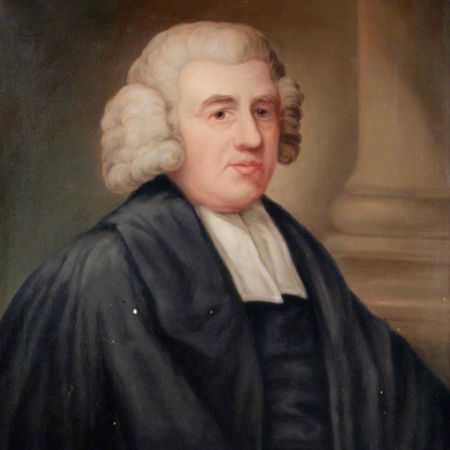 Picture an old woman with a halo of silvered hair—the hot tears flowing down her furrowed cheeks—her worn hands busy over a washboard in a room of poverty—praying—for her son John—John who ran away from home in his teens to become a sailor—John of whom it was now reported that he had become a very wicked man—praying, praying always, that her son might be of service to God. The mother believed in two things, the power of prayer, and the reformation of her son. God answered the prayer by working a miracle in the heart of John Newton.
Picture an old woman with a halo of silvered hair—the hot tears flowing down her furrowed cheeks—her worn hands busy over a washboard in a room of poverty—praying—for her son John—John who ran away from home in his teens to become a sailor—John of whom it was now reported that he had become a very wicked man—praying, praying always, that her son might be of service to God. The mother believed in two things, the power of prayer, and the reformation of her son. God answered the prayer by working a miracle in the heart of John Newton.
John Newton, the sailor-preacher. Among the thousands of men and women he brought to Christ was Thomas Scott, cultured, selfish, and self-satisfied. Because of the washtub prayers another miracle was worked, and Thomas Scott used both his pen and voice to lead thousands of unbelieving hearts to Christ, among them a dyspeptic, melancholic young man, William Cowper by name. He, too, was washed in the cleansing blood and in a moment of inspiration wrote “There Is a Fountain Filled With Blood.” And these songs have brought countless thousands to the Man who died on Calvary. All this resulted because a mother took God at His word and prayed that her son’s heart might become as white as the soapsuds in the washtub.[2]
If you want to see the results of Adam and Eve’s sin come with me to the heart of Africa.
At a young age, John Newton went to sea. Like most sailors of his day, he lived a life of rebellion and debauchery. For several years, he worked on slave ships, capturing slaves for sale to the plantations of the New World. So low did he sink that at one point he became a slave himself, captive of another slave trader. Eventually, he became the captain of his own slave ship. The combination of a frightening storm at sea, coupled with his reading of Thomas à Kempis’s classic Imitation of Christ, planted the seeds that resulted in his conversion. He went on to become a leader in the evangelical movement in 18th century England, along with such men as John and Charles Wesley, George Whitefield, and William Wilberforce. On his tombstone is inscribed the following epitaph, written by Newton himself: “John Newton, clerk, once an infidel and Libertine, a servant of slavers in Africa, was, by the rich mercy of our Lord and Savior Jesus Christ, preserved, restored, pardoned, and appointed to preach the Faith he had long labored to destroy” (Kenneth W. Osbeck, 101 Hymn Stories [Grand Rapids: Kregel, 1982], 28). When he penned the beloved hymn “Amazing Grace,” he knew firsthand the truths it proclaimed.
In a hymn that chronicles his own conversion, John Newton movingly describes the transforming power of Christ:
In evil long I took delight,
Unawed by shame or fear,
Till a new object struck my sight,
And stopped my wild career.
I saw One hanging on a tree,
In agony and blood;
He fixed His loving eyes on me,
As near His cross I stood.
How can it be, upon a tree
The Savior died for Me?
My soul is thrilled, my heart is filled,
To think He died for me.[3]
Mel Trotter
Mel Trotter was a barber by profession and a drunkard by perversion. So debauched had he become that when his young daughter died, he stole the shoes she was to be buried in and pawned them for money to buy more drinks. One night he staggered into the Pacific Garden Mission in Chicago and was marvelously saved. Burdened for the men of skid row, he opened a rescue mission in Grand Rapids, Michigan. He went on to found more than sixty more missions and became supervisor of a chain of them stretching from Boston to San Francisco (Elgin S. Moyer, Who Was Who in Church History [New Canaan, Conn.: Keats, 1974], 411).
In this sermon we are finishing Genesis 3. In the verses before us we will see one of the clearest pictures of mankind’s sinfulness, for they were running from God. And we see one of the most beautiful sights of all, the grace of our God who comes looking for His lost creatures.
Now, lets stand and ask God to illumine our hearts as we read these verses. Genesis 3:7-24
Mankind RUNNING v. 7-8
 What happened when a Holy Creator confronts His fallen creatures? They hid. The same practice continues to this day. Why do most people resist God’s Word? They are brought into the presence of God and like their first parents, they hide and flee for they do not want to be exposed.
What happened when a Holy Creator confronts His fallen creatures? They hid. The same practice continues to this day. Why do most people resist God’s Word? They are brought into the presence of God and like their first parents, they hide and flee for they do not want to be exposed.
God SEEKING v. 9
Why did God ask questions? God was not seeking information, rather He sought that man might be humbled to the point of personal confession of his sin.
Martin Luther comments on Genesis 3:9 that:
Sin is progressive. Adam not only disobeys God, he starts to even blame God. The literal rendering in these verses is “I would not have fled if thy voice had not frightened me” He actually is accusing the Lord Himself of sinning! Luther in his sermon on this passage concludes by saying:
“Thou, Lord, hast sinned.” I can think of nothing more able to show sin’s horror than this miserable tendency of men to blame the holy, all-wise God for our own transgressions.”
Sin is the same everywhere We often look only outwardly at sin and thus see some as worse than other. This is because of judging by a person’s circumstances than by God’s holy character. The great preacher Donald Barnhouse once told of a missionary journey in which he saw the old Great North Road, which led out of Calcutta and toward the northwest frontier. The old road was a hardened mudpacked dirt road that had been used for centuries. He traveled on the paved road from modern times. In the rainy season, the travelers on the old mud road sloshed and struggled through mud that sometimes got knee deep. When a traveler was invited up onto the paved road it was so much easier. The illustration he drew was so clear. Even when the way gets easier, it is still the same old man, on the same road and headed in the same direction. Jesus said as much in Matthew 7 as He spoke of the broad road that leads to destruction. There is a paved section where lost people seem to have it easy. There is the muddy side and those seem to always have it so hard. Both roads lead to destruction whether in a fine linen suit or in tattered rags.[4]
Sin blinds us to even god’s goodness is Luther’s final point. As Adam and Eve were not instantly consumed and cast into outer darkness is a sign of His grace. But sin blinds us to that grace. Sin like a cloud obscures God from sight and humanity stumbles through life with self-produced blinders, never seeing the Goodness of God.
The Fall was an assault upon the Love of God, Truth of God, and Majesty of God.
Mankind BLAMING v. 10-13
We should stop here and take note that this idea is not easy for us to understand or accept because of our modern tendency toward “me—me—me.” Our individualism makes many reject, with little thought, the idea that we could possibly share in Adam’s sin.
But the Biblical mind did not have this problem. In Hebrew “Adam” means mankind. People in Bible times understood that the human race has a corporate solidarity in Adam. Thus all mankind was present and actually sinned in Adam. Adam was not a mere representative for mankind showing what we would do if we had the same temptation. We were Adam. “Adam is mankind,” as F. F. Bruce says, and as Adam we sinned. This is Biblical thinking, and it is therefore the only right thinking about man’s condition. Any interpretation that departs from this thought or waters it down is mistaken. This is Pauline doctrine, the doctrine of Augustine, the Reformed position and that of orthodoxy. It is the only correct view.
God JUDGING v. 14-19
Mankind BELIEVING v. 20
God’s promise in 3:15 and Adam’s faith in 3:20 are both seen in 4:1. Eve brought new life into the world, and she thought her child was the promised Seed. “I have gotten a man—the Lord!” is a possible translation. “Cain” means “acquired”—the baby boy was looked upon as a gift from God. Abel means “vanity, vapor”—it suggests the futility of life apart from God, or perhaps Eve’s disappointment that Cain was not the promised Seed. From the very beginning, we see a division of work: as Cain is identified with the ground, Abel with the flock. God had already cursed the ground (3:17), so Cain is identified with that curse.
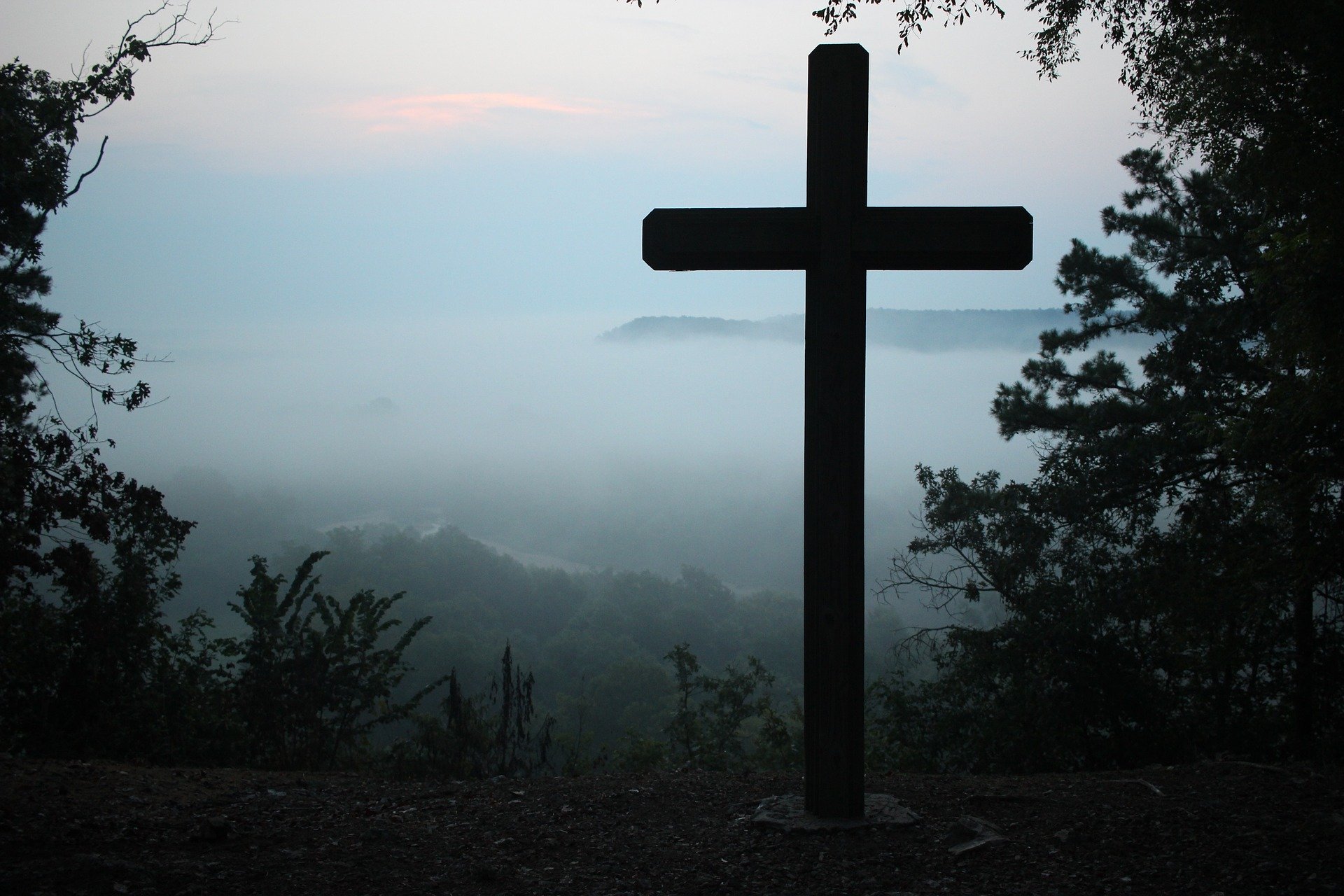 Hiding in Thee—Ira David Sankey
Hiding in Thee—Ira David Sankey
O safe to the Rock that is higher than I,
My soul in its conflicts and sorrows would fly;
So sinful, so weary, Thine, Thine would I be;
Thou blest “Rock of Ages,” I’m hiding in Thee.
Chorus Hiding in Thee, Hiding in Thee,
Thou blest “Rock of Ages,”
I’m hiding in Thee.
2 In the calm of the noontide, in sorrow’s lone hour,
In times when temptation casts o’er me its pow’r;
In the tempests of life, on its wide, heaving sea,
Thou blest “Rock of Ages,” I’m hiding in Thee.
3 How oft in the conflict, when pressed by the foe,
I have fled to my Refuge and breathed out my woe;
How often, when trials like sea-billows roll,
Have I hidden in Thee, O Thou Rock of my soul.[5]
God COVERING v. 21
The lesson of Genesis 3:21 is the inability of fig leaves (which are our efforts to hide our sins) to avail. The provision of animal skins by God, are the start of the beautiful pathway to the Cross of Calvary.
- In Eden it was one sacrificial death of an animal that would cover the sins of one person.
- Later the Passover taught that a sacrificial lamb could cover the sins of a family.
- The Day of Atonement demonstrated that an animal could cover the sins of a nation.
- But it was John the Baptist standing at Jordan’s banks that pointing to Jesus, who shouted out there was a Lamb coming who would take away the sin of the world!
So one substitute for one person; one substitute for one family; one substitute for one nation; one substitute for the world[6]. That is the grace of God.
And in all the world and throughout all of human history only two ways have been available for sinners. The religion of fig leaves which is the religion of work, or the revelation of animal skins, which is the revelation of God’s perfect provision of the gracious death of Christ.
Isn’t it amazing that the only thing Jesus cursed on earth was the fig tree for its fruitlessness? And this may just be a New Testament reminder of how deadly and horrible are the self-manufactured sin coverings of religious people. It is an eternally dangerous practice to hide, cover, and try to get rid of sin apart from Jesus Christ’s perfect, substitutionary sacrifice.
When you hear the voice of God after your life on earth is passed, will you run and hide behind your fig leaves? Or will you stand clothed in the righteousness of Christ?
Jesus told a haunting story of a wedding feast in Matthew 22. The ending should catch our attention:
Matthew 22:11-14 “But when the king came in to see the guests, he noticed a man there who was not wearing wedding clothes. 12 ‘Friend,’ he asked, ‘how did you get in here without wedding clothes?’ The man was speechless. 13 “Then the king told the attendants, ‘Tie him hand and foot, and throw him outside, into the darkness, where there will be weeping and gnashing of teeth.’ 14 “For many are invited, but few are chosen.”
Actually, all are invited. The question of eternal proportions is: Are you among the chosen? Are you wearing the Lamb who was slain for your sin?
 Edward Mote
Edward Mote
My Hope Is Built on Nothing Less (or The Solid Rock)
My hope is built on nothing less
Than Jesus’ blood and righteousness;
I dare not trust the sweetest frame,
But wholly lean on Jesus’ name.
When darkness veils His lovely face,
I rest on His unchanging grace;
In ev’ry high and stormy gale,
My anchor holds within the veil.
His oath, His covenant, His blood,
Support me in the whelming flood;
When all around my soul gives way,
He then is all my hope and stay.
When He shall come with trumpet sound,
O may I then in Him be found,
Dressed in His righteousness alone,
Faultless to stand before the throne.
On Christ, the Solid Rock, I stand;
All other ground is sinking sand,
All other ground is sinking sand.
Mankind WORSHIPING v. 22-24
This earliest family must have known a definite place for worship, for both sons brought offerings to the Lord. It may be that the glory of God tabernacled at the tree of life, with the way guarded by the cherubim (3:24). Hebrews 11:4 indicates that Abel brought his offering by faith; and Rom. 10:17 teaches that faith comes by hearing, (NKJV). This means that God must have taught Adam and his family how to approach Him, and 3:21 indicates that sacrifice of blood was involved. Hebrews 9:22 states that there must be the shedding of blood before there can be the remission of sin, but Cain brought a bloodless offering from the cursed earth. His offering may have been sincere, but it was not accepted. He had no faith in God’s Word or dependence on the sacrifice of a substitute. God probably “answered by fire” (Lev. 9:24) and burned up Abel’s offering, but Cain’s offering lay there on the altar.
Cain had a form of godliness and religion, but he denied the power (2 Tim. 3:5). First John 3:12 indicates that Cain was a child of the devil, and this means he practiced a false righteousness of the flesh, not the righteousness of God through faith. Jesus called the self-righteous Pharisees “children of the devil” and blamed their kind for the death of Abel (Luke. 11:37–51). Jude 11 talks about “the way of Cain,” which is the way of religion without blood, religion based on religious good works and self-righteousness. There are only two religions in the world today: (1) that of Abel that depends on the blood of Christ and His finished work on the cross; and (2) that of Cain that depends on good works and man-pleasing religion. One leads to heaven, the other to hell![7]
God ACCEPTING v. 22-24
Do you see that without Jesus you don’t have any way to come to God. Do you see you are totally helpless to get rid of your sins?
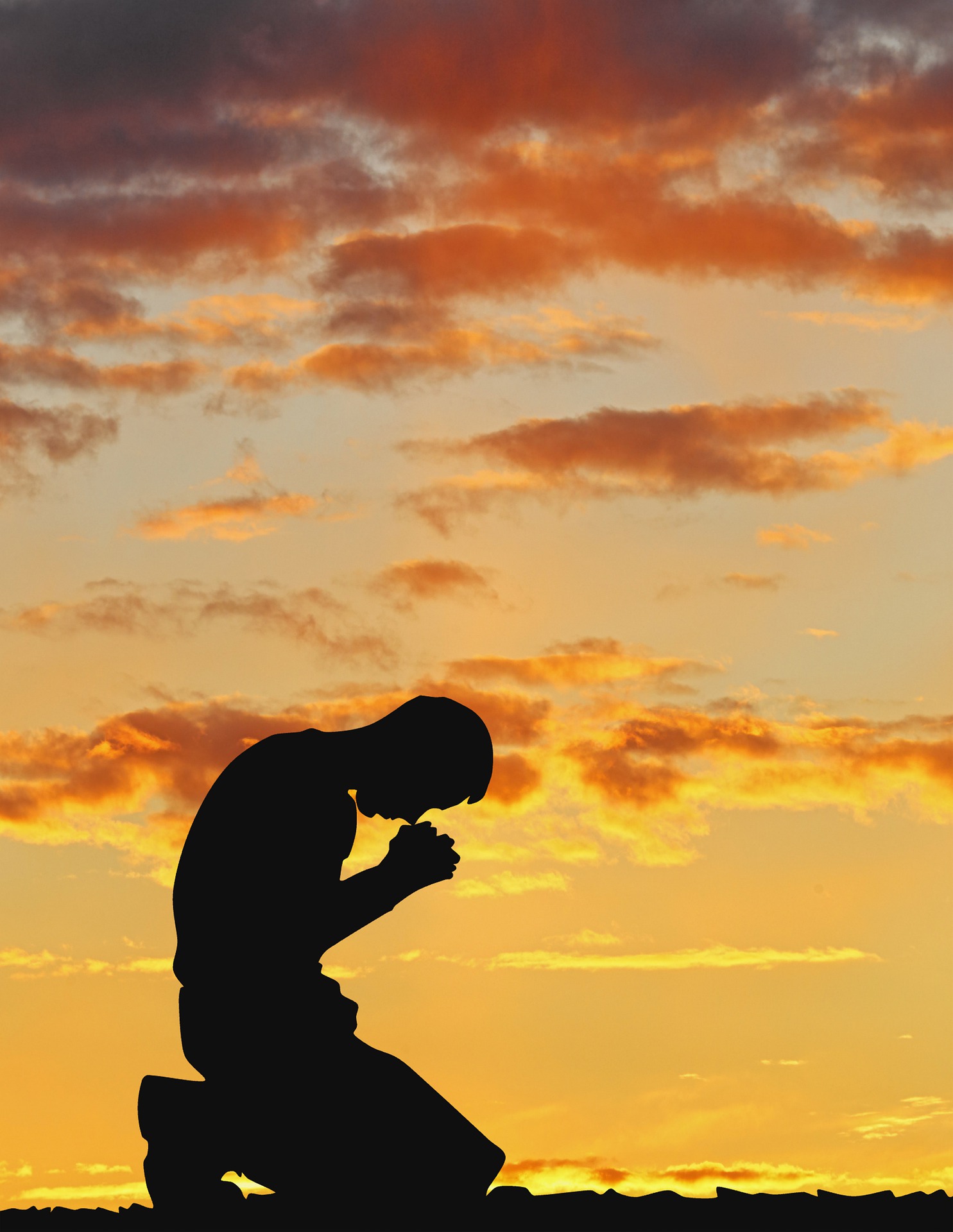 William T. Sleeper
William T. Sleeper
Out of My Bondage
1 Out of my bondage, sorrow and night,
Jesus, I come, Jesus, I come;
Into Thy freedom, gladness and light,
Jesus, I come to Thee;
Out of my sickness, into Thy health,
Out of my want and into Thy wealth,
Out of my sin and into Thyself,
Jesus, I come to Thee;
2 Out of my shameful failure and loss,
Jesus, I come, Jesus, I come;
Into the glorious gain of Thy cross,
Jesus, I come to Thee;
Out of earth’s sorrows, into Thy balm,
Out of life’s storms and into Thy calm.
Out of distress to jubilant psalm,
Jesus, I come to Thee;
3 Out of unrest and arrogant pride,
Jesus, I come, Jesus, I come;
Into Thy blessed will to abide,
Jesus, I come to Thee;
Out of myself to dwell in Thy love,
Out of despair into raptures above,
Upward for aye on wings of a dove,
Jesus, I come to Thee;
4 Out of the fear and dread of the tomb,
Jesus, I come, Jesus, I come;
Into the joy and light of Thy home,
Jesus, I come to Thee;
Out of the depths of ruin untold,
Into the peace of Thy sheltering fold,
Ever Thy glorious face to behold,
Jesus, I come to Thee;
Doubt God’s Authority v. 4 “You will not surely die.” What Satan wants is for us to DOUBT GOD. We doubt God when we doubt His Authority. Satan wants us to believe is that God is not in charge – we are in charge; God isn’t interested in our choices – are in charge; God will not make us accountable for our deeds – we are in charge.
The religion of works righteousness was begun with Satan’s rebellion against God. As Lucifer, the highest of the angels, he attempted to usurp God’s throne and glory by his own creaturely efforts (see Isa. 14:12-15; Luke 10:18). It was with the lure of self-effort that he tempted Eve, and indirectly Adam, to eat the forbidden fruit, deceiving them into thinking that by self-willed disobedience they could wrest divinity for themselves (Gen. 3:1-7). It was the same lure of self-willed effort that prompted Cain to offer his own kind of sacrifice to the Lord and to offer it in presumption rather than faith (4:3-7). In each case God rejected and condemned the self-willed efforts of His creatures. He cast Satan out of heaven, cast Adam and Eve out of the Garden, and refused to accept the faithless sacrifice of Cain.
Augustine was getting at the same thing that Edwards was. Fallen man has not lost his ability to make choices. The sinner still is able to choose what he wants; he can still act according to his desires. Yet, because his desires are corrupt, he does not have the royal liberty of those set free unto righteousness. Fallen man is in a serious state of moral bondage. That state of bondage is called original sin.
Original sin is a very difficult subject that virtually every Christian denomination has had to face. The fall of man is so clearly taught in Scripture that we cannot construct a view of man without taking it into consideration. There are few, if any, Christians who argue that man is not fallen. Without acknowledging that we are fallen, we cannot acknowledge that we are sinners. If we do not acknowledge that we are sinners, we can hardly flee to Christ as our Savior. Admitting our fallenness is a prerequisite for coming to Christ.
Let us begin by stating what original sin is not. Original sin is not the first sin. Original sin does not refer specifically to the sin of Adam and Eve. Original sin refers to the result of the sin of Adam and Eve. Original sin is the punishment God gives for the first sin. It goes something like this: Adam and Eve sinned. That is the first sin. As a result of their sin humanity was plunged into moral ruin. Human nature underwent a moral fall. Things changed for us after the first sin was committed. The human race became corrupt. This subsequent corruption is what the church calls original sin.
Original sin is not a specific act of sin. It is a condition of sin. Original sin refers to a sin nature out of which particular sinful acts flow. Again, we commit sins because it is our nature to sin. It was not man’s original nature to sin, but after the Fall, his moral nature changed. Now, because of original sin, we have a fallen and corrupt nature.
Fallen man, as the Bible declares, is born in sin. He is “under” sin. By nature we are children of wrath. We are not born in a state of innocence.
John Gerstner was once invited to preach at a local Presbyterian church. He was greeted at the door by the elders of the church, who explained that the order of worship for the day called for the administration of the sacrament of infant baptism. Dr. Gerstner agreed to perform the service. Then one of the elders explained a special tradition of the church. He asked Dr. Gerstner to present a white rose to each infant’s parents before the baptism. Dr. Gerstner inquired about the meaning of the white rose. The elder replied, “We present the white rose as a symbol of the infant’s innocence before God.”
 “I see,” replied Dr. Gerstner. “And what does the water symbolize?”
“I see,” replied Dr. Gerstner. “And what does the water symbolize?”
Imagine the consternation of the elder when he tried to explain the symbolic purpose of washing away the sin of innocent babies. The confusion of this congregation is not unique. When we acknowledge that infants are not guilty of committing specific acts of sin it is easy to jump to the conclusion that they are therefore innocent. This is a theological broad jump into a pile of swords. Though the infant is innocent of specific acts of sin he is still guilty of original sin.
To understand the Reformed view of predestination it is absolutely necessary to understand the Reformed view of original sin. The two matters stand or fall (no pun intended) together.
The Reformed view follows the thinking of Augustine. Augustine spells out the state of Adam before the Fall and the state of mankind after the Fall. Before the Fall Adam was endowed with two possibilities: He had the ability to sin and the ability not to sin. After the Fall Adam had the ability to sin and the inability to not sin. The idea of the “inability to not” is a bit confusing to us because in English it’s a double negative. Augustine’s Latin formula was non posse non peccare. Stated another way, it means that after the Fall man was morally incapable of living without sin. The ability to live without sin was lost in the Fall. This moral inability is the essence of what we call original sin.
When we are born again, our bondage to sin is relieved. After we are made alive in Christ, we once again have the ability to sin and the ability to not sin. In heaven we will have the inability to sin.
Let’s look at this with a chart:
| Pre-Fall Man | Post-Fall Man | Reborn Man | Glorified Man |
| able to sin | able to sin | able to sin | able to not sin |
| able to not sin | unable to not sin | able to not sin | unable to sin |
The chart shows that man before the Fall, after the Fall, and after being reborn is able to sin. Before the Fall he is able to not sin. This ability, the ability to not sin, is lost in the Fall. It is restored when a person is born again and continues in heaven. In creation man did not suffer from moral inability. Moral inability is a result of the Fall. To state it another way, before the Fall man was able to refrain from sinning; after the Fall man is no longer able to refrain from sinning. That is what we call original sin. This moral inability or moral bondage is overcome by spiritual rebirth. Rebirth liberates us from original sin. Before rebirth we still have a free will but we do not have this liberation from the power of sin, what Augustine called “liberty.”
The person who is reborn can still sin. The ability to sin is not removed until we are glorified in heaven. We have the ability to sin but we are no longer under the bondage of original sin. We have been set free. This of course does not mean that now we live perfect lives. We still sin. But we can never say that we sin because that is all our fallen natures have the power to do.[8]
[1] MacArthur, John F., The MacArthur New Testament Commentary, (Chicago: Moody Press) 1983, Acts 9.
[2] Tan, Paul Lee, Encyclopedia of 7,700 Illustrations, (Garland, Texas: Bible Communications, Inc.) 1996.
[3] MacArthur, John F., The MacArthur New Testament Commentary, (Chicago: Moody Press) 1983.
[4] Barnhouse, God’s Methods for Holy Living, (Grand Rapids: Eerdmans, 1951), p. 175.
[5] Eckert, Paul, Steve Green’s MIDI Hymnal, (Oak Harbor, WA: Logos Research Systems, Inc.) 1998.
[6] Boice, Genesis 3:21, p. 238.
[7] Warren W. Wiersbe, Wiersbe’s Expository Outlines on the Old Testament, (Victor Books: The Bible Exposition Commentary) Wheaton, IL.
[8] Sproul, R. C., Chosen by God, (Wheaton, Illinois: Tyndale House Publishers, Inc.) 1986.
Slides
Check Out All The Sermons In The Series
You can find all the sermons and short clips from this series, Genesis here.
You can find all the sermons and short clips from this series, Paradise Lost – From Creation To The Fall here.
Looking To Study The Bible Like Dr. Barnett?
Dr. Barnett has curated an Amazon page with a large collection of resources he uses in his study of God’s Word. You can check it out here.

